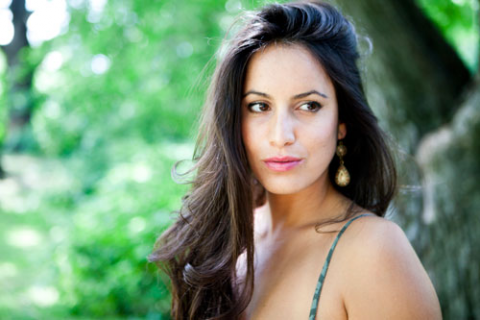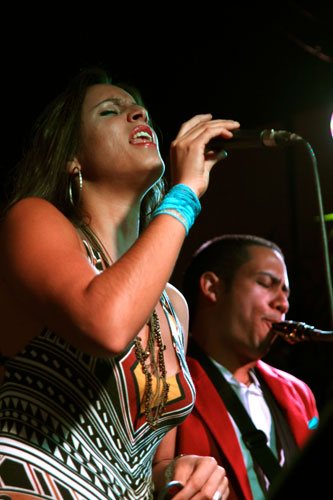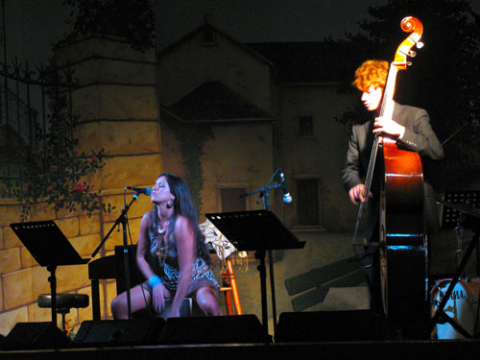Student Profile: Mor Ben Yakir

Mor Ben Yakir<br>
<b>Hometown:</b> Eilat, Israel<br>
<b>Major:</b> Performance<br>
<b>Instrument:</b> Voice
Photo by Kelly Davidson

"For me, jazz is not necessarily just a genre as it is a concept, a language, a state of mind and a way to dig into the depth of things," says Ben Yakir.
Photo by Kelly Davidson

Ben Yakir performs in Nancy, France.
Photo by amanda gouldthorpe

Ben Yakir plays the cajon and sings in Nancy, France.
Photo by Maximin Costa
Growing up in Eilat, Israel, Mor Ben Yakir took advantage of the cultural panoply offered at the Red Sea Jazz Festival. But once the annual festival's big name artists left town, there weren't many musical opportunities in Israel's southernmost city. "I didn't have any access to the musical education I was really craving," says Ben Yakir, a seventh semester vocalist and composer. Frustrated but undeterred, she traveled to Tel Aviv as often as she could to soak in the culture. After graduating from high school she moved there and became part of the jazz scene, and a subsequent trip to New York convinced her that she would need to travel east to further her musicianship.
That goal was realized when in the summer of 2007, Ben Yakir participated in a Berklee workshop at the Red Sea Jazz Festival and earned a scholarship to the college. From expanding her musical horizons to making connections never possible back home—one of her closest friends at Berklee is Palestinian—the performance major has more than found her way. In the process, she's found new meaning to the inspirational Judaic phrase "tikkum olam," or world repairing. "It means that if every person in the world will repair something within himself . . . the world would become a better place," says Ben Yakir. "As a person who grew up in a country that is soaked with blood of so many wars, and in a reality where I had to see so many people I know losing their lives for uncertain purposes, I feel more determined than ever to be that person who will lead that change, that tolerance, that acceptance—through creation. . . I feel [any] real change in the world would come out of healthy communication and a collaboration between people, between countries." At Berklee, with its robust international community, Ben Yakir has discovered some fertile ground for that phrase.
to Mor Ben Yakir's "The Last One"
In the following interview, Ben Yakir talks about using her voice as an instrument, drawing inspiration from nature, and enjoying Berklee's international mix.
How would you describe your music?
If I could give only one word to describe it, I would say jazz. I was jazz trained. If I could give more than one word, I would say "sea desert music." For me, making music is my life story and my life background and my childhood and my future. One of the most honest and basic relations of my foundation as a human being came with the connection to the sea and desert, as I grew up at the feet of the desert mountains right on the Red Sea. I feel really safe when I'm within deserts or seas. Even though my path led me to the city and smoke and the subway and noise, I always have that as a balance. It's always there and in my music.
For lot of people who've listened to my music, the first association they shared with me is related to these scenes.
Tell me about how you initially came to learn music.
It all relates to the city where I grew up. When I was younger, in high school, and realized the limitations of this place artistically, I was really, really frustrated that in Eilat—the southernmost city in the country and separated in a way from everything in the center and all the arts schools—I had to see my friends coming out of these schools and receiving so much precious information on a silver platter. It ignited in me a very big passion. That's how I began educating myself musically. I was saving money and spending it on CDs as much I could and learning from the records of Ella Fitzgerald, Sarah Vaughan, Miles Davis, and John Coltrane. I moved to Tel Aviv right after high school, and I began looking for some private instruction to close those gaps.
How did you persevere in the face of such limited access?
I recognized so much freedom and depth within that thing called jazz; I felt that this was an interesting way for me to explore and express myself. The one thing that did happen in my hometown was the Red Sea Jazz Festival, which is probably what originally shook me and exposed me to this world of freedom. It was all during my childhood, every August. Every time this festival happened, I would think it was the best four days of my life. There was a sense of freedom in the air and music was everywhere. Very big artists would come and play on a huge stage. I remember I was very young listening to that music, and I was just stunned. That was my first exposure to music and somehow I realized I wanted to be a part of that.
Along with the festival there was a very small conservatory [the Red Sea Eilat Conservatory] that the Russian immigration of the '90s brought along. I studied classical piano there when I was young and that was my first official musical training. It was pretty limited and very traditional. That was my training. I realized I was attracted to the voice and different ways to express myself musically. It was hard to do a lot with it until I left. During high school, I would escape to Tel Aviv every second weekend and try to find out what was going on with the jazz scene.
How do you approach music making?
For me, creating music is a process. Music is a way to be into the depth of things and to know yourself better. And not just creating, but when performing music it's a process of being in the moment and being very connected with the now. It's something I feel we tend to forget in day-to-day life; we're always thinking about the next thing, the next meeting, and we forget to fill the moment sometimes. Part of my goal is for my music to reflect honesty and communication—communication with the moment, with the people you are creating music with. In jazz one of the most basic fundamentals is to be very honest and sensitive, to listen and respond in a way that's supportive; you're trying to make something united, one thing as a group, and it's not about my fame or my solo or my show.
What's been remarkable about your Berklee experience?
One of the biggest gifts I've received from Berklee is the level of internationality. Having at least one friend from every country is something that is really priceless. I feel like it's something I couldn't achieve in any other school. I just had my senior recital and I had this incredible chance to perform with one of the people I have become closest to at Berklee. He happens to be from Palestine. Every time I think about it, it shakes my mind. Even if he and I had met within the borders of our countries, which wouldn't be likely, there would be so many boundaries and fears. Here, it's such a neutral environment and the main focus for us is really about healing and creation and communication and truth and honesty. It's amazing and something I'm not sure people back home would be able to understand on both sides. But for us, people who would be considered enemies, he could be like a brother.
How has your music grown at Berklee?
First of all, I feel that my biggest musical growth and development is followed by personal development. It's very linked for me. It's inseparable. There are a few teachers who helped me to develop that and provide me with more tools. One is Ed Tomassi. Lisa Thorson for private instruction. She was really able to understand my path, what I'm aiming to do—as a vocalist not trying to be a singer. I'm trying to develop [my voice] more as an instrumentalist than as a singer.
Tell me more about that.
I felt that I happened to express my musicality through the voice. I was always attracted to practice routines or classes that were more [geared to] horn players or piano players. The ensembles I did at Berklee were more instrumentally oriented. I use my voice like an instrument: lyric-less, vocalese. Lisa was one of the only people to really understand that and support it without trying to change me.
I recently came back from this amazing tour that Berklee supported and financed in Nancy, France. I was chosen to lead my own group and perform in the festival and many other venues. Performing my original music and being the band leader and the composer and the arranger was a lot of responsibility but great closure to conclude this period at Berklee. It was a way to prove to myself that the path my natural instinct was trying to follow—from my time in Eilat to these days trying to be more of an instrumentalist—worked. And even if it's very uncommon, I realized the people in France listened to it and it appealed to them.
